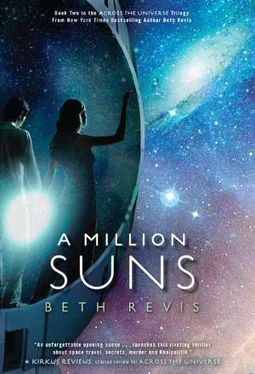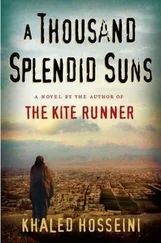Beth Revis - A Million Suns
Здесь есть возможность читать онлайн «Beth Revis - A Million Suns» весь текст электронной книги совершенно бесплатно (целиком полную версию без сокращений). В некоторых случаях можно слушать аудио, скачать через торрент в формате fb2 и присутствует краткое содержание. Год выпуска: 2012, ISBN: 2012, Жанр: Фантастика и фэнтези, на английском языке. Описание произведения, (предисловие) а так же отзывы посетителей доступны на портале библиотеки ЛибКат.
- Название:A Million Suns
- Автор:
- Жанр:
- Год:2012
- ISBN:978-1-101-55224-7
- Рейтинг книги:4 / 5. Голосов: 1
-
Избранное:Добавить в избранное
- Отзывы:
-
Ваша оценка:
- 80
- 1
- 2
- 3
- 4
- 5
A Million Suns: краткое содержание, описание и аннотация
Предлагаем к чтению аннотацию, описание, краткое содержание или предисловие (зависит от того, что написал сам автор книги «A Million Suns»). Если вы не нашли необходимую информацию о книге — напишите в комментариях, мы постараемся отыскать её.
A Million Suns — читать онлайн бесплатно полную книгу (весь текст) целиком
Ниже представлен текст книги, разбитый по страницам. Система сохранения места последней прочитанной страницы, позволяет с удобством читать онлайн бесплатно книгу «A Million Suns», без необходимости каждый раз заново искать на чём Вы остановились. Поставьте закладку, и сможете в любой момент перейти на страницу, на которой закончили чтение.
Интервал:
Закладка:
And the French Revolution isn’t a topic I would have thought Bartie would study.
Was he interested in the frea — I stop myself from even thinking the word — was he interested in the unusual woman on the cover of the book? Or was he interested in the guillotine cutting off the king’s head? I mentally shake myself. I’m being paranoid.
“Food,” Bartie says.
“Food?”
He nods, pushing the volume closer to me and picking up a slender book bound in green leather. “I thought it was… interesting. That ‘let them eat cake’ bit — I wonder if they would have even revolted if there hadn’t been the shortage of food.”
“Maybe they were just revolting from dresses like that,” I say as I point to the voluminous swaths of silk pouring off the woman’s skirt on the cover of the book. I’m trying for levity again, but Bartie’s not laughing and neither am I — my mind is remembering the red line in the chart Marae showed me, the line that showed the decreasing food production. When the rest of the ship sees how quickly the food’s disappearing — that the ship is dead in the empty sky, and that soon we will be too — how long will it be till they, like the people in Bartie’s book, turn their farm tools into weapons and revolt?
Bartie doesn’t answer me, just flips open the smaller green book. His eyes don’t move over the letters, though, and I get the feeling he’s waiting for me to say or do something. I’m not so sure I’m just being paranoid anymore.
“Something’s going to have to change, and soon,” Bartie says, his eyes on the book. “It’s been building for months, ever since you turned them.”
“I didn’t—” I say automatically, defensive even though there was no real accusation in his voice. “I just… I mean, I guess I changed them, but I changed them back . To what they’re supposed to be. What they are.”
Bartie looks doubtful. “Either way, they’re different now. And it’s getting worse.”
The first cause of discord, I think, is difference.
Bartie turns the page of the slender green book. “Someone’s got to do something.”
The second cause of discord: lack of a strong central leader.
What does he think I’ve been doing? Shite, all I do these days is run from one problem to the next! If it’s not a strike in one district, it’s complaints from another — and every problem is just a little worse than the one before it.
Bartie glares at me. There’s no question about it now: there’s contempt and anger in his eyes, although his voice remains soft-spoken. “Why aren’t you stepping up? Why aren’t you keeping the order? Eldest might’ve been a chutz, but at least you didn’t have to worry about getting through the day when he was in charge.”
“I’m doing what I can,” I protest.
“It’s not enough!” The words bounce around the room, slamming into my ears.
Without thinking about it, I pound my fist onto the table. The noise startles Bartie; the shock of it makes me forget my anger. I shake my hand, pain tingling up my arm.
“What are you reading?” I growl.
“What?”
“What are you frexing reading?”
When I glance up, Bartie’s eyes meet mine. Our anger melts. We’re friends — even without Harley, we’re still friends. And even if the ship hasn’t exactly been a friendly place lately, we can still hold onto our past.
Bartie lifts the smaller book for me to see the title: The Republic, by Plato.
“I read that last year,” I say. “It was confusing as frex. That bit about the cave made no sense at all.”
Bartie shrugs. “I’m at the part about aristocracy.” He pronounces it “a-risto-crazy.” Eldest told me it was “ah-rista-crah-see” but he probably got it wrong too, and besides, what’s the difference?
I know the part he’s talking about well — it was the center of the lesson Eldest had prepared for me. It was also, essentially, the base of the entire Eldest system. “An aristocrat is someone born to rule,” I say. “Someone born with the innate talent to guide everyone else.”
Bartie can’t be thinking what I’m thinking: that the only reason I was born to rule was because I was plucked as an embryo from a tube full of other genetically enhanced clones whose DNA had been modified to make the ideal ruler.
“But even Plato says that the ideal state of an aristocracy can decay,” Bartie says.
The word decay reminds me of the entropy Marae mentioned, how everything is constantly spinning out of control, including the ship. Including me.
“An Eldest is like an aristocrat,” Bartie adds. He’s searching my eyes now, the book forgotten, as if he wants me to pick up some deeper meaning to what he’s saying. I pull my mind away from the broken engine and Marae’s lies and back to the conversation at hand.
“But the Eldest system isn’t decaying,” I say. “It works. It is working.”
“You’re not Eldest,” Bartie points out. “You’re still Elder.”
I shake my head. “In name only. I can rule without taking on the title.”
“Titles confuse me.” Bartie picks up The Republic again, closing it and staring at the cover. “This book talks about aristocracy and tyranny like they’re two different things, but I don’t see a difference.” He slides it across the table. “There are other forms of government, though.”
“What are you saying?” I ask warily.
Bartie stands and so do I. “You don’t have to be alone in this,” he says. “Look at the reality of the situation. Even if you are the one aristocrat on this ship, the one leader — you’re sixteen years old. Maybe you will be a great leader…”
“Will be?” I growl.
He shrugs. “People don’t respect you now. Maybe in another five or ten years.”
“People respect me because of what I am!”
Bartie drops the book on the table; its thud echoes on the metal surface. He heads toward the door, shouldering past me when he nears. “You’ve given us all the chance to think, to choose for ourselves what we want.” His voice is quiet, almost a whisper. “I respect that . But you’ve got to realize that maybe, when we’ve had a chance to think about it, we’re not going to choose you as our leader.”
Bartie picks up two books from the table — the history of the French Revolution and a book from the science room, Technical Instruction on Communication Systems. He abandons Plato’s Republic on the table and carries the other books across the room without speaking. When the door zips closed after him, though, it feels as if there are a lot of words drifting through the silence he leaves behind.
The last cause of discord. Individual thought.
He has no idea that I haven’t slept a full night in three months. That I do nothing but try to figure out how to keep a ship full of angry, passionate, self-aware people from self-destruction. That now, on top of everything else, I have the dead engine to worry about. All he sees is my failure.
If I can’t rule without Phydus, that’s all any of them will ever see.
Failure.
For giving them back their lives and not being able to save them from themselves.
When I step back outside, I have to blink to adjust to the brightness. Everything seems calmer here, more still, almost reverent. The Recorder Hall wasn’t loud, exactly, but it wasn’t quiet, either.
Something catches my gaze. I turn slowly.
Beside the door to the Recorder Hall is a painting, a portrait of me, held in a place of honor. It was one of the last paintings Harley ever made.
And someone’s shredded it.
It looks as if a giant claw of knives ripped through the canvas — five long gashes slice through my face and chest, spilling out strings and dried paint like bleeding wounds. The background behind me in the painting — a mirror of Godspeed ’s fields and farms — is mostly untouched. Whoever did this took care to dismantle my face and leave the rest of the painting unharmed.
Читать дальшеИнтервал:
Закладка:
Похожие книги на «A Million Suns»
Представляем Вашему вниманию похожие книги на «A Million Suns» списком для выбора. Мы отобрали схожую по названию и смыслу литературу в надежде предоставить читателям больше вариантов отыскать новые, интересные, ещё непрочитанные произведения.
Обсуждение, отзывы о книге «A Million Suns» и просто собственные мнения читателей. Оставьте ваши комментарии, напишите, что Вы думаете о произведении, его смысле или главных героях. Укажите что конкретно понравилось, а что нет, и почему Вы так считаете.












